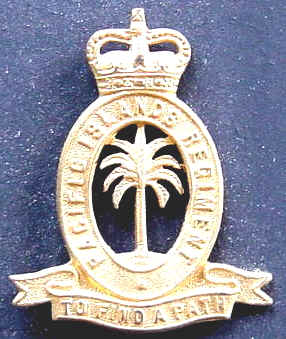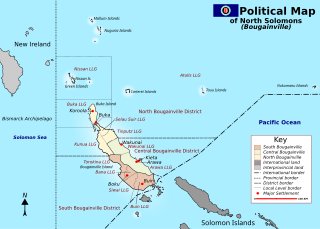
The Papua New Guinea Defence Force (PNGDF) is the military organisation responsible for the defence of Papua New Guinea. It originated from the Australian Army land forces of the territory of Papua New Guinea before independence, coming into being in January 1973 and having its antecedents in the Pacific Islands Regiment. The PNGDF is a small force, numbering around 3,600 personnel, and consists of a Land Element, an Air Element and a Maritime Element. It is a joint force tasked with defending Papua New Guinea and its territories against external attack, as well as having secondary functions including national-building and internal security tasks.

Bougainville, officially the Autonomous Region of Bougainville, is an autonomous region in Papua New Guinea. The largest island is Bougainville Island, while the region also includes Buka Island and a number of outlying islands and atolls. The current capital is Buka, situated on Buka Island.

Solomon Islands is a country consisting of six major islands and over 900 smaller islands in Oceania, to the northeast of Australia. It has a land area of 28,400 square kilometres (11,000 sq mi), and a population of approximately 700,000. Its capital, Honiara, is located on the largest island, Guadalcanal. The country takes its name from the wider area of the Solomon Islands (archipelago), which is a collection of Melanesian islands that also includes the Autonomous Region of Bougainville, but excludes the Santa Cruz Islands.

Bougainville, an autonomous region of Papua New Guinea (PNG), has been inhabited by humans for at least 29,000 years, according to artefacts found in Kilu Cave on Buka Island. The region is named after Bougainville Island, the largest island of the Solomon Islands archipelago, but also contains a number of smaller islands.

The Regional Assistance Mission to Solomon Islands (RAMSI), also known as Operation Helpem Fren, Operation Anode and Operation Rata, was created in 2003 in response to a request for international aid by the Governor-General of Solomon Islands. Helpem Fren means "help a friend" in Solomon Islands Pidgin. The mission officially ended on 30 June 2017.

The Royal Pacific Islands Regiment (RPIR) is an infantry regiment of the Papua New Guinea Defence Force (PNGDF). The regiment is descended from the Australian Army infantry battalions formed from native soldiers and Australian officers and non-commissioned officers in the territories of Papua and New Guinea during World War II to help fight against the Japanese. Disbanded after the war, the regiment was re-raised in 1951 as part of the Australian Army and continued to serve until Papua New Guinea gained its independence in 1975, when it became part of the PNGDF. Today, the RPIR consists of two battalions and has seen active service in Vanuatu, Bougainville and the Solomon Islands.
Francis Ona was a Bougainville secessionist leader who led an uprising against the Government of Papua New Guinea as part of the Bougainville Civil War. He and his followers were concerned about the environmental and social effects of the operation of the Panguna mine by Bougainville Copper, a subsidiary of Rio Tinto Group. On 17 May 1990, Ona declared the independence of the Republic of Me'ekamui. It was not recognised internationally. In May 2004 Ona proclaimed himself "King of Me'ekamui." While resisting the peace process and 2005 elections, Ona mostly stayed in a safe haven, where his BRA forces controlled territory. He died of malaria in his village.

Relationships between Fiji and Papua New Guinea became strained in November 2005 in the wake of reports that 9 Fijian soldiers believed to be mercenaries had reportedly entered the disputed territory of the Kingdom of Me'ekamui on Bougainville in Papua New Guinea illegally and were arming and training a private militia on the island of Bougainville.
Bougainville – Our Island Our Fight is a 1998 Australian documentary film. It was produced and directed by Wayne Coles-Janess.

The Panguna mine is a large copper mine located in Bougainville, Papua New Guinea. Panguna represents one of the largest copper reserves in Papua New Guinea and in the world, having an estimated reserve of one billion tonnes of ore copper and twelve million ounces of gold. The mine has been closed since 1989 and has ceased all production.
Peter Sobby Tsiamalili was the Papua New Guinean civil servant who served as the first chief administrator of the Autonomous Region of Bougainville (ABG) following successful elections in June 2005. Tsiamalili also served as a diplomat and ambassador representing Papua New Guinea abroad in Fiji and Belgium.

James Tanis is a politician in Papua New Guinea who was elected President of the Autonomous Region of Bougainville in 2008 following the death of Joseph Kabui while in office, serving the remainder of the term from 2009 to 2010. He was previously the Vice President of the Bougainville People's Congress.

New Zealand–Papua New Guinea relations refers to the diplomatic relations between New Zealand and the Independent State of Papua New Guinea. Both nations are members of the Commonwealth of Nations, the Pacific Islands Forum and the United Nations.
Noah Musingku, under the name "King David Peii II", claims to be head of the twin "kingdoms" of Papaala and Me’ekamui on Bougainville Island in the North Solomon Islands, which are not considered to be real kingdoms by any government authority. Musingku is the creator of U-Vistract, which was banned as a pyramid scheme in Papua New Guinea. After the banning of U-Vistract in Papua New Guinea, Musingku fled to Bougainville, taking advantage of the political situation on Bougainville to avoid prosecution and the aggrieved investors of U-Vistract from whom he had collected millions of kina. As of November 2020, his "kingdoms" remain at large, mainly due to fears of destabilising the island and because many of the local authorities have invested in him. Musinku's influence in Bougainville is widely considered one of the chief problems facing President of the Autonomous Region of Bougainville Ishmael Toroama in his attempts to stabilise Bougainville in preparation for its independence.

The Bougainville conflict, also known as the Bougainville Civil War, was a multi-layered armed conflict fought from 1988 to 1998 in the North Solomons Province of Papua New Guinea (PNG) between PNG and the secessionist forces of the Bougainville Revolutionary Army (BRA), and between the BRA and other armed groups on Bougainville. The conflict was described by Bougainvillean President John Momis as the largest conflict in Oceania since the end of World War II in 1945, with an estimated 15,000–20,000 Bougainvilleans dead, although lower estimates place the toll at around 1,000–2,000.
John Bika was a Papua New Guinea and Bougainvillean politician.

A non-binding independence referendum was held in Bougainville, an autonomous region of Papua New Guinea, between 23 November and 7 December 2019. The referendum question was a choice between greater autonomy within Papua New Guinea and full independence; voters voted overwhelmingly (98.31%) for independence.
Theodore Miriung was a politician and judge in Bougainville, Papua New Guinea. He was Premier of the Bougainville Transitional Government from April 1995 until his death.
Ishmael Toroama is a Bougainvillean politician who was elected President of the Autonomous Region of Bougainville in 2020. He is a former commander in the Bougainville Revolutionary Army.
Leo Nuia was an officer in the Papua New Guinea Defence Force.









